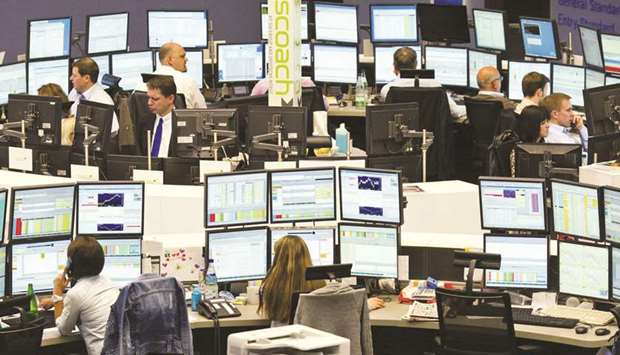Pound plunged on Brexit woes and a buoyant euro soared yesterday as ECB head Christine Lagarde forecast the eurozone’s coronavirus downturn would be less severe than feared.
As major stock markets marked time, Lagarde acknowledged a recent spike in coronavirus cases was causing “headwinds” for the recovery whose pace remained uncertain, but added data pointed to a “strong rebound” in the third quarter.
According to the European Central Bank’s latest forecasts, the eurozone economy is likely to shrink by 8.0% this year, compared with an earlier projection of -8.7%.
Lagarde told reporters the rise of the euro had been discussed — though it was absent from the policy statement — and was “something to be monitored carefully.”
She said the ECB was not targeting a euro level. But she added: “We are monitoring carefully the impact of our currency on our medium-term inflation level.” Her comments did not stop the single currency hitting $1.19 against the US dollar, close to the September 1 two-year high of $1.20. It rose still further against drooping sterling, hitting 92.33 pence — a six-month low for the British unit, which has lost more than three% in the past week against both the euro and the greenback after Britain decided to override elements of its EU withdrawal bill, prompting a furious response from an aghast Brussels.
“Sterling took a bit of a kicking as the mood music around this week’s Brexit talks took a decided turn for the worse,” was the verdict of Markets.com chief markets analyst Neil Wilson.
Regarding the euro, “the absence of any mention of the exchange rate in the policy statement confirms our view that the ECB is not too worried about the currency at present,” said Andrew Kenningham, chief Europe economist for Capital Economics.
“It is clear the ECB are not going to try and devalue the euro, probably because they don’t want to take on the Fed in an easing fight.
Sterling remains under pressure due to uncertainty surrounding the UK-EU trade negotiations,” added David Madden of CMC Markets.
Boris Johnson’s government provoked EU ire after it introduced legislation that intentionally breaches its obligations regarding Northern Ireland in the withdrawal treaty.
The move has fanned fears of no trade agreement being reached, dealing a double-whammy to a British economy already ravaged by virus lockdowns.
London’s FTSE 100 closed 0.2% down at 6,013.32 points, Frankfurt’s DAX 30 ended 0.2% down at 13,208.89 points and Paris’ CAC 40 finished 0.4% down at 5,023.93 points, while the EURO STOXX 50 finished 0.3% lower at 3,315.74 points.
In the US meanwhile, the Dow Jones Industrial Average struggled to make headway along with major European markets, dipping 0.3% two hours into the day session.
That followed mixed US labour data and continued dim prospects for additional stimulus spending from Washington.
The tech-rich Nasdaq led major Wall Street indices higher after being at the center of a three-day pullback that shaved 10% from the index following a record on September 2.
Tiffany shares tumbled after French luxury group LVMH said it was withdrawing from a $16.2bn acquisition which would have been the biggest ever in the luxury industry.
LVMH blamed arguments over deal-closing deadlines and threatened US tariffs on French goods, while Tiffany filed a lawsuit against the French company in a US court.
At the close in Europe, London’s benchmark FTSE 100 gained 1.4%, helped by the struggling pound.
“Stock markets are back in rally mode as investors look to get back to their ‘buy the dip’ ways that proved so successful over the past few months,” said Chris Beauchamp, chief market analyst at IG.
Elsewhere, hopes for a coronavirus vaccine won a boost following a report in the Financial Times that the trial being conducted by AstraZeneca and the University of Oxford could resume early next week, ending a pause after a volunteer developed an unexplained illness.
The drug is a frontrunner in the global race for a vaccine.
Oil prices rebounded slightly, meanwhile, from recent sharp losses.
Large tech companies such as Apple and Amazon were back on offense after the three-day retreat caused by profit-taking and concerns the firms that have prospered during the pandemic have risen too far, too fast.
But Gregori Volokhine, portfolio manager at Meeschaert financial Services, said the reversal was too indiscriminate.
“You can’t put all the companies in the same basket,” said Volokhine, who said that some valuations such as Tesla’s had gotten out of control.
“But you can’t say the gains of companies like Apple and Microsoft have really lost a link to reality,” he added.

Brokers working on their computers at the Frankfurt Stock Exchange.The DAX 30 ended 0.2% down at 13,208.89 points yesterday.
